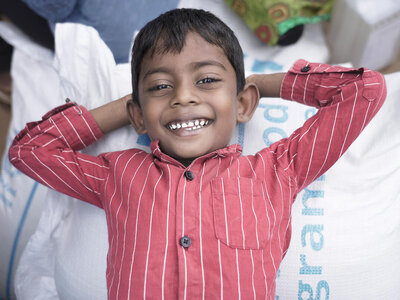Sri Lanka
- 26%
- of population live below poverty line
- 39%
- of households report inadequate diets
- 19 million
- Sri Lankans in locations set to become moderate or severe climate hotspots by 2050
Sri Lanka is a small island, middle-income nation that achieved significant progress in its human development and socioeconomic spheres, following the end of its 27-year civil conflict in 2009.
However, this progress has been derailed by events including the COVID-19 pandemic and an economic crisis which has affected vast swathes of the population.
Over a quarter of the population is now estimated to live below the poverty line, which compromises their ability to access sufficient, nutritious food.
The impacts of Cyclone Ditwah continue to unfold months after its landfall in November 2025. Disrupted livelihoods, displacement, and restricted market access has increased food insecurity with 39 percent of households now facing inadequate diets.
A WFP Household Food Security Overview in 2024 showed that more than half of households (51 percent) are resorting to measures such as reducing meal portions or having less-preferred meals, indicating vulnerability to prolonged food insecurity.
Nearly one-third of children under 5 are malnourished. Meanwhile, over 40 percent of women aged 18-60 are overweight or obese, due to poor dietary diversity and lack of access to nutritious food.
The climate emergency is increasing the frequency and severity of extreme weather events such as floods, drought and landslides, heightening the risk of food and nutrition insecurity.
WFP has been in Sri Lanka since 1968, working with the Government to address malnutrition, support families’ access to food, and improve the productivity and incomes of smallholder farmers. WFP is now focusing on long-term development that helps improve food security and nutrition in the country.
What the World Food Programme is doing in Sri Lanka
-
Nutrition
-
WFP supports the national health system in the prevention and management of moderate acute malnutrition. Projects include strengthening national capacities to improve the availability, accessibility, and consumption of fortified foods; strengthening programmatic efforts through research on food security and nutrition; and conducting social behaviour change communication campaigns to improve dietary practices. The Scaling Up Nutrition Business Network was launched in 2019 to increase private sector engagement in nutrition-related solutions.
-
School feeding
-
Resilience building and livelihood support
-
Emergency preparedness and response
-
Social protection
Sri Lanka news releases
Go to pageFind out more about the state of food security in Sri Lanka
Visit the food security analysis pageOperations in Sri Lanka
Contacts
Office
Colombo Country Office 2, Jawatte Avenue, Colombo 5, Sri Lanka
Colombo
Sri Lanka







